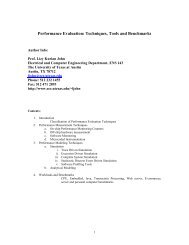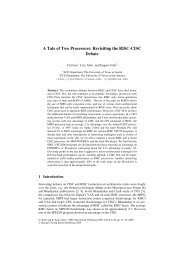Copyright by William Lloyd Bircher 2010 - The Laboratory for ...
Copyright by William Lloyd Bircher 2010 - The Laboratory for ...
Copyright by William Lloyd Bircher 2010 - The Laboratory for ...
Create successful ePaper yourself
Turn your PDF publications into a flip-book with our unique Google optimized e-Paper software.
Core Power<br />
power is dominated <strong>by</strong> leakage power since active power is low. Leakage power is<br />
mostly affected <strong>by</strong> p-state changes. Fluctuations in IPC occur at much shorter durations<br />
(100s ns) than p-state changes (100s ms). <strong>The</strong>re<strong>for</strong>e, stable power consumption levels<br />
are less likely as the number of active cores increases.<br />
60W<br />
50W<br />
40W<br />
30W<br />
20W<br />
10W<br />
0W<br />
-10W<br />
4.3 Summary<br />
Phases due<br />
to 10ms<br />
scheduling 11%<br />
quanta 15%<br />
9%<br />
10%<br />
7%<br />
11%<br />
17% 28% 13%<br />
8%<br />
21%<br />
12%<br />
9%<br />
64%<br />
Figure 4.9 Core Power Phases – SYSmark 2007<br />
This section characterizes power consumption in modern server and desktop computing<br />
systems. <strong>The</strong> characterization demonstrates the relationship between the power<br />
consumption of various subsystems and workloads. Popular computational workloads<br />
such as SPEC CPU are shown to generate power variation in the processor and memory<br />
subsystems, but not in the remainder of subsystems. By comparing power variation in a<br />
server system with little power management to a recent desktop system with extensive<br />
62<br />
Active<br />
Program<br />
Phases<br />
35%<br />
12% 8%<br />
12% 17% 11% 22%<br />
1 10 100 1,000 10,000<br />
Phase Duration (ms)<br />
3D<br />
E-Learning<br />
Productivity<br />
Video Creation<br />
Relative size<br />
correspond to %<br />
samples in group<br />
Idle Phases




